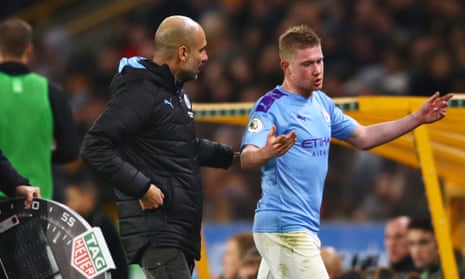Manchester City are due to hear on Monday whether their two-year ban from the Champions League for a serious breach of Uefa’s financial fair play rules has been upheld or overturned, following their appeal to the court of arbitration for sport. On Friday Cas announced the verdict would be released at 9.30am BST.
City’s hierarchy have throughout vehemently and vitriolically contested the finding of Uefa’s club financial control body’s “adjudicatory chamber” that they committed a serious breach of FFP rules by overstating sponsorships from Abu Dhabi companies.
The AC, made up of senior European lawyers, including Charles Flint QC, also found City had not cooperated with the investigation by the CFCB’s “investigatory chamber”, itself a breach of a club’s duties towards a governing body. The two-year ban from European football’s most glittering competition, and €30m fine, reflected the seriousness with which the Uefa’s AC viewed City’s alleged breaches of the rules.
If the ban is upheld by Cas, it would represent a crisis for the club and its Abu Dhabi ownership, who would lose out on the prestige and substantial revenues from competing in the Champions League, and need to persuade players to remain with the club. Pep Guardiola has said he will honour his contract, although it concludes at the end of next season and he has not yet committed himself beyond that. Kevin De Bruyne has said he would review his position if the ban is upheld and it would not be a surprise if other players also consider their options.
After the judgment against them, City released a furious statement, refusing to recognise any independence of the CFCB or its members, claiming the case against the club was a biased process by Uefa, “initiated by Uefa, prosecuted by Uefa and judged by Uefa”. City said they were placing their faith in the Lausanne-based Cas as “an independent body and process to impartially consider the comprehensive body of irrefutable evidence in support of [the club’s] position”.
FFP, introduced in 2010-11 with the goal of improving European football’s chaotic finances, is aimed at encouraging clubs not to overspend on players’ wages and rely on funding from owners. Rather they must break even, spend only the money they make in genuine revenues. Although by agreement between Uefa and City the AC did not publish its judgment, because City were appealing, it is assumed to have found that sponsorship by Etihad, stated to be £67.5m in 2015-16, was not in fact mostly paid by the Abu Dhabi airline.
That was the suggestion from leaked internal City emails and documents published by the German magazine Der Spiegel in November 2018, which sparked the CFCB investigation. One email, from City’s then chief financial officer, Jorge Chumillas, asked a more senior City executive to clarify whether only £8m was being paid by Etihad, and the other £59.5m was being provided by City’s owner, Sheikh Mansour of the Abu Dhabi ruling family. The reply to Chumillas was not published by Der Spiegel and City, while furiously denying any wrongdoing, have never publicly explained why Chumillas would write that email, nor what the reply was.
City’s initial refusal to comment or engage at all with questions from the media or Uefa was based on their indignation that they believed their emails had been hacked or stolen. Der Spiegel, in its coverage, included an interview with its source, his name changed to “John”, who said he had not hacked computers to obtain the emails.
Shortly afterwards, John was identified as Rui Pinto, a Portuguese national, who was arrested and charged with 147 criminal offences in Portugal, including hacking, which he denies. The charges relate to alleged offences committed in Portugal or against Portuguese football clubs and organisations, not to the City documents.
Cas is the agreed independent arbitration process for disputes between individual athletes or clubs, and sports governing bodies. On 10 June Cas said the hearing of City’s appeal had concluded after starting two days earlier and had been heard by a panel of three lawyers: the chairman Rui Botica Santos, a Portuguese lawyer specialising in sports law and arbitration; Ulrich Haas, a law professor based in Zurich, and Andrew McDougall QC, a partner in the international law firm White and Case, based at the Paris office.
Uefa has not commented on the case, except to announce the guilty finding of the AC in February. There is unlikely to be much silence after a verdict that will leave either City or Uefa’s FFP regime in crisis.
